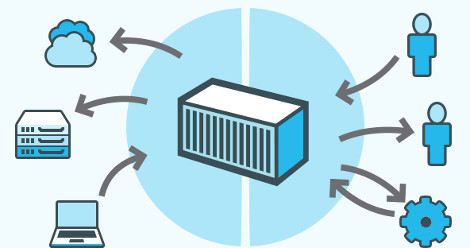Linux Container Standards Org Adds Members, Including OracleLinux Container Standards Org Adds Members, Including Oracle
Broad membership expected to address fear of lock-in among users
July 22, 2015

Roughly 30 days after launching the project, Docker revealed that 11 additional vendors, including Oracle, have now signed on to support the Open Container Initiative. The company made the announcement at the Open Source 2015 Conference (OSCON) in Portland today.
Intended to make it possible to share images across multiple types of Linux containers, the announcement comes on the heels of the formation of a Cloud Native Computing Foundation, announced this week, which incorporates OCI technology into its core specification.
Launched as the Open Container Project, the effort was renamed to Open Container Initiative to avoid confusion with other OCPs, such as the Open Compute Project or the Linux Foundation’s Open Compliance Program.
In addition to signing up new members, David Messina, vice president of marketing for Docker said, the company is also making available today a draft of the charter under which OCI will operate.
“We’ve made a lot of progress in a month,” said Messina. “The end goal is to create a specification that enables Docker to easily run across multiple data center environments.”
While Docker initially evolved as an alternative to running virtual machines on a Linux platform, the number of places IT organizations are running applications that are distributed has increased substantially. In most cases Docker containers are deployed on bare-metal servers by developers.
But in some production environments IT operations teams have taken to deploying Docker containers on VMs in order to leverage their existing management tools. At the same time, Platform-as-a-Service environments, such as Cloud Foundry and Deis, have emerged as vehicles for deploying Docker containers as well. The end result is a broad mix of Docker container deployment scenarios that OCI is meant to ensure a level of transparency and interoperability across.
In fact, with enough vendors signaling OCI support any initial concerns IT organizations might have had about becoming locked into a particular Linux container implementation are quickly becoming a non-issue, which means IT operations teams should have greater confidence in making use of Docker containers in production environments, said Messina.
While there is no doubt that Docker containers are all the rage among developers, it’s clear that IT operations teams are still coming to terms with all the implications of supporting those applications in production. But with more vendors signaling support for OCI it’s now only a matter of time before those applications start to be deployed in ever increasing numbers.
Vendors and IT organizations that have committed to OCI now include:
AT&T, ClusterHQ, Datera, Kismatic, Kyup, Midokura, Nutanix, Oracle, Polyverse, Resin.io, Sysdig, Suse, Twitter, Verizon, Amazon Web Services, Apcera, Cisco, CoreOS, Docker, EMC, Fujitsu Limited, Goldman Sachs, Google, HP, Huawei, IBM, Intel, Joyent, Mesosphere, Microsoft, Pivotal, Rancher Labs, Red Hat, and VMware.
About the Author
You May Also Like







